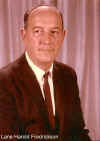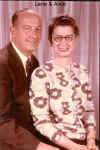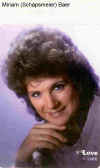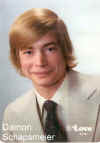

Lane Fredrickson
Viewed from the perspective of a century, Charles Fredrickson and the household that he and Grandma Fredrickson established are precisely what one would expect of people of their time, place, origin, and beliefs. They were the essence of immigrant America in virtually every respect. It is clear that they had come from modest, if not humble, backgrounds in Sweden at a time when both social and economic mobility were limited there. They were also both members of a religious group limited in size and status.
The impact of suddenly finding themselves in a new environment in which nothing but oneís ambition, capability, and character mattered clearly had the same catalytic effect on them that it did on virtually all who came. They were people of energy and determination unusual even for their generation, however. One cannot avoid the sense that Charles and Christina were driven to make the most of the opportunity they found here and do so in the shortest possible time.
Their household was a classic European patriarchy. Charles was a proud and rather autocratic man and, while he certainly loved his children, he expected, and received, respect and obedience. It is also clear, however, that he neither intimidated nor dominated his wife. Her will, determination, and temper were at least equal to his, and he went to great lengths to avoid angering her.
They were profoundly religious people and believed absolutely in the classic values of honesty, hard work, best effort, and the utmost in moral behavior. It goes without saying that they were determined to imbue their children with the same set of values, and they succeeded to a remarkable degree.
Their children, with one exception, adopted their values as their own and lived their lives by them in the most conventional sense. The one exception was Lane, the youngest of the nine who lived to adulthood. Lane did not live his life in that same conventional manner, but his story, in the end, may be the most triumphal of all. He was the Fredrickson Prodigal!
Lane was born almost exactly seven years after Dad, and he was
always Dadís "little brother" in his mind. Dadís acceptance of the
values taught by his parents was complete and there was much about his brotherís
behavior in early life that Dad disapproved. The strongest terms he ever used in
my hearing, however, was, "that darned Lane". It was evidence to me of
a tolerance that he probably did not understand himself and would certainly not
have afforded either of his sons.
mind. Dadís acceptance of the
values taught by his parents was complete and there was much about his brotherís
behavior in early life that Dad disapproved. The strongest terms he ever used in
my hearing, however, was, "that darned Lane". It was evidence to me of
a tolerance that he probably did not understand himself and would certainly not
have afforded either of his sons.
Dad believed that Lane was the most generously gifted of the entire family describing him variously as "much too smart for his own good" and "able to charm birds down out of the trees". Lane was hansom, athletic, and possessed of a reckless daring quite uncharacteristic of his brother and sisters. He was, by some measure, the largest of the five brothers standing nearly six feet in height and broad shouldered he obviously inherited physically from the Nelsons and not from the Fredricksons. He was a powerful swimmer and saved at least two from drowning in the deep holes created by the floods under the railroad tracks where the family and many others swam.
Dad and all of Laneís brothers and sisters were puzzled and saddened, however, by the failure of his first marriage and what they viewed as his abandonment of his family. He did not maintain contact with his mother or the rest of the family for a number of years during WW II. When he did reappear for a visit in the late 1940ís, he confided in Dad and others that he had had a long struggle with alcoholism. After his marriage to Alice Koch in 1954, however, communication with the family resumed.
Lane returned to visit several times after his life had completed its circular journey back to its initial bearings. Those of us who had know him only by reputation and hearsay met a person of great warmth, humor, charm, and obvious intelligence. There were some in the family who displayed a small measure of the resentment of the Ďelder brotherí of the Biblical parable. Dad was not one of those, however. His relief and gratitude were complete.
We are greatly in debt to our cousin MarJean (Fredrickson) Schapsmeier for writing and sharing the following profile of her father and for the pictures as well.
"Lane Harold Fredrickson was the youngest child of Charles
and Christina Fredrickson, born May 24,  1913. He grew up in the family home in
Cloud County and married Hazel L. Christensen on November 4, 1933. Hazel and
Lane met while both were active in the Baptist Church of Concordia. They lived
in Concordia for 2 years, but later moved to Smith Center, Kansas where Lane
owned and operated a small restaurant. They had one child, MarJean, on January
15, 1936. They were divorced in February 1938.
1913. He grew up in the family home in
Cloud County and married Hazel L. Christensen on November 4, 1933. Hazel and
Lane met while both were active in the Baptist Church of Concordia. They lived
in Concordia for 2 years, but later moved to Smith Center, Kansas where Lane
owned and operated a small restaurant. They had one child, MarJean, on January
15, 1936. They were divorced in February 1938.
Lane worked his way west, as a chef in several restaurants. He married Virginia (unknown) on January 27,1940. He joined the Army on March 10, 1942 during WWII and improved his culinary skills as a Chef III for the 837th Bomb Squadron in Central Europe. He was awarded a Good Conduct Medal and was discharged September 10, 1945.
Upon his return home he worked several years in a steel mill and
made many friends. After his marriage to Alice Mae Koch on March 1, 1954, they
resided in Canoga Park, in the Los Angeles area, where he and Alice became
active in a Baptist Church. Lane was also a counselor for an AA group in the San
Fernando Valley. In 1960, he became interested in real estate and joined the
Century 21 firm in 1964 and soon became a manager of one of its offices.
marriage to Alice Mae Koch on March 1, 1954, they
resided in Canoga Park, in the Los Angeles area, where he and Alice became
active in a Baptist Church. Lane was also a counselor for an AA group in the San
Fernando Valley. In 1960, he became interested in real estate and joined the
Century 21 firm in 1964 and soon became a manager of one of its offices.
 MarJean moved with her mother to Washington D.C. in 1946. There
she completed her education and was employed by the Bell Telephone Co. She and
Hans Schapsmeier were married in the New York Ave. Presbyterian Church on June
9, 1957. Upon Hans' discharge from military service, they established their home
in Cleveland, Ohio where Hans returned to his employment as an engineer at
Standard Oil. They adopted two children, Damon Paul, born May 23, 1961 and
Miriam Lynne, born June 1,1963.
MarJean moved with her mother to Washington D.C. in 1946. There
she completed her education and was employed by the Bell Telephone Co. She and
Hans Schapsmeier were married in the New York Ave. Presbyterian Church on June
9, 1957. Upon Hans' discharge from military service, they established their home
in Cleveland, Ohio where Hans returned to his employment as an engineer at
Standard Oil. They adopted two children, Damon Paul, born May 23, 1961 and
Miriam Lynne, born June 1,1963.
MarJean became acquainted with Lane and Alice in 1966 while Hans
was on a brief assignment in San Francisco. During the following years their
relationship became quite close with mutual visits, phone calls and letters.
 Damon, a diabetic died on February 7, 1990. Miriam married
William Baer and resides in Mt. Plymouth, Florida where she is employed by the
city of Altamonte Springs as a Manager of Budgets. She has no children.
Damon, a diabetic died on February 7, 1990. Miriam married
William Baer and resides in Mt. Plymouth, Florida where she is employed by the
city of Altamonte Springs as a Manager of Budgets. She has no children.
Upon retirement in 1978, Lane and Alice relocated to Carson City, Nevada. Lane once again made many friends, and they became active in the Baptist Church. They were able to travel until Lane's health began to fail. Alice died August 16, 1995 and MarJean and Hans were able to place Lane in an excellent assisted-living home in Carson City. MarJean and Hans were able to make the trip from Ohio every few months to visit with him and look after his welfare.
 Hazel and Lane renewed their friendship when she was able to
travel on two of these
Hazel and Lane renewed their friendship when she was able to
travel on two of these occasions. After a short illness, he died unexpectedly on
January 8, 1999 at the age of 85. He is buried in the Carson City Cemetery in
Nevada."
occasions. After a short illness, he died unexpectedly on
January 8, 1999 at the age of 85. He is buried in the Carson City Cemetery in
Nevada."
MarJean (Fredrickson) Schapsmeier